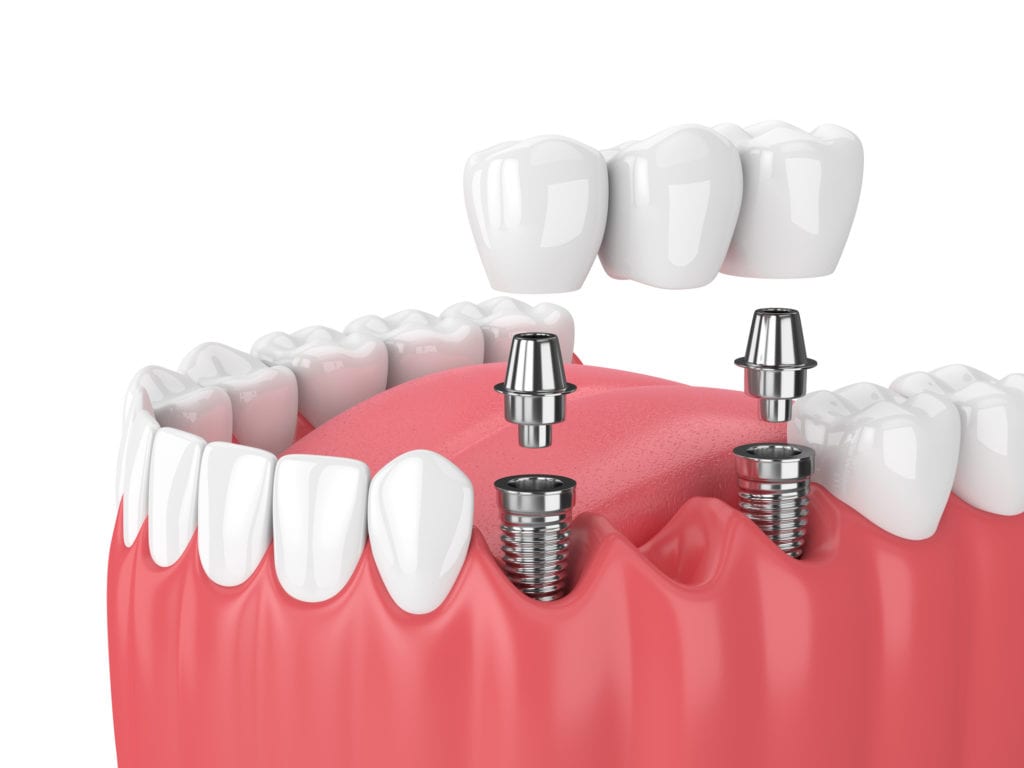Are you missing multiple consecutive teeth? Do you want a comfortable and durable replacement for your missing teeth? Dr. Elizabeth Duling offers dental bridges as a restorative dentistry service to patients in her Owens Cross Roads, AL, dental office. Traditional dental bridges use the support of natural teeth to hold prosthetic teeth in place. We can also cap off your natural teeth with crowns as protection. Dental implants can secure more modern dental bridges, particularly fixed ones.

Dental Bridge Treatment
Dental bridges can be removable or fixed. Removable bridges are not as stable or permanent as fixed bridges, so they are often temporary. We use this type of bridge before a patient’s fixed bridge is complete. Alternatively, fixed bridges offer more structural support. If we secure it with dental implants, fixed bridges last longer and are more stable in the mouth. Dental implants replace teeth at the root and support the health of the whole dental structure.
We can provide temporary crowns or a bridge while you wait for your permanent bridge. We will refer you to a specialist if you receive dental implants for your bridge. Our team can create dental crowns as well as the final bridge restoration.
Which Bridge is Right for Me?
Typically, we recommend that you secure a fixed bridge with dental implants. This is the most stable dental bridge possible. When dental implants secure the bridge instead of your natural teeth, you don’t have to worry about wear and tear. Natural anchor teeth are susceptible to increased wear, tooth decay, and other dental problems. Dental implants help you avoid this problem while still looking and feeling like natural teeth in your mouth.
Implants provide many different benefits to your oral health. They stop further jawbone deterioration and can help spur bone regeneration in your jaw as the implants osseointegrate. You no longer have to worry about a sagging facial appearance because your facial muscles and skin will be supported. Implants also allow you to eat a wider variety of foods to keep a well-balanced, varied diet.
However, not everyone is eligible for dental implants. You must have a certain amount of healthy bone structure to secure the implants. Dental implants are also a pricey restoration. While they’re well worth the money, we understand they may not always be within your budget. Removable bridges and bridges secured by natural teeth are the most cost-efficient methods. However, you will need to replace them in the future.
Caring For a Dental Bridge
After your treatment, the mouth will still feel numb. Refrain from eating and drinking hot beverages until you are no longer numb. This ensures you don’t accidentally bite down on your soft tissue or unknowingly burn your mouth. Depending on your bridge option, we’ll teach you how to care for your bridge.
You can brush and floss them like regular teeth for implant-supported fixed bridges. Use a soft-bristled toothbrush and non-abrasive toothpaste so you don’t scratch or damage the restoration. To floss under the bridge, you’ll usually need a floss threader or interdental brush to clean all the necessary areas. A water flosser is also a good option. An antimicrobial mouthwash helps remove bacteria and keep your mouth fresh and clean.
Special cleaning routines are required for removable bridges. Denture cleaners are an option for deep cleaning the bridge at least once a week. Each evening, use a brush and non-abrasive toothpaste to scrub the bridge, preventing plaque and tartar buildup.
Dental bridges withstand regular chewing of food. But avoid biting down directly with your bridge or hard or sticky foods. Hard foods can cause damage, and sticky foods can get stuck or dislodge the bridge. You should also wear a mouthguard to protect the restoration if you’re playing contact sports or you grind your teeth at night.
Smoking or using any form of tobacco can harm your oral health. It increases your risk of gum disease, which can also harm your dental bridge. Smoking increases your risk of tooth decay, dry mouth, and other oral health problems.
Frequently Asked Questions about Dental Bridges
Dental bridges are a popular method to replace one or multiple missing teeth. Learn more by reading the answers to these commonly asked questions.
How long will my dental bridge last?
The longevity of your bridge depends on how well you take care of your oral health. Poor oral hygiene is the number one cause of bridge failure. If you brush and floss daily and visit your dentist every six months for professional cleaning, your dental bridge can last up to ten years. Most people have their bridges replaced every five to seven years.
Can my tooth get infected under a dental bridge?
The natural teeth under the bridge’s dental crown can still suffer from dental problems. This includes infections and tooth decay. If you do not properly brush and floss your teeth, especially around the bridge, tiny bits of food can get under there and cause these problems.
We often recommend investing in a water flosser for patients getting a dental bridge. This additional dental tool can remove bacteria from under the bridge and prevent infection and decay from developing.
What is the best way to secure a dental bridge?
For several missing teeth, you can have your bridge cemented to abutment teeth, or you can have it secured to dental implants. Dental implants offer better retention and will last forever. Utilizing implant fixtures to secure the bridge will also save your healthy teeth from being ground down, leading to permanent damage. The implants will also help preserve the jawbone. If your dentist cements a bridge to abutment teeth, this cannot prevent bone loss in the jaw.
Contact Our Office for Dental Treatment
Do you need to restore the form and function of your teeth? Learn more about what dental bridges can do for your smile. Request a consultation with Dr. Duling online or call her Owens Cross Roads dental office at 256.202.4186.
